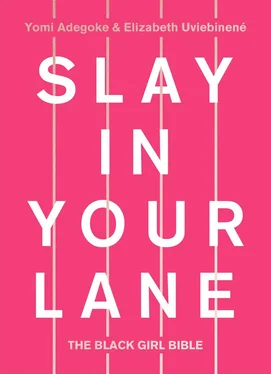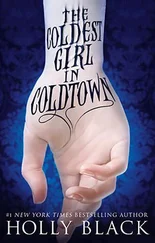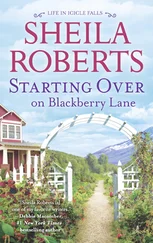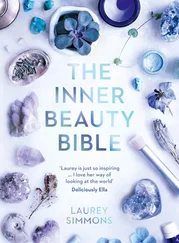Something that my then 13-year-old self had already frequently experienced but had never been able to articulate was perfectly captured in a 30-second skit: that the different facets of my identity – being black, being a woman – impact on who I am, and what my experience in this country is. It explained why I only somewhat related to stories focused on black men and white women. It highlighted why seeing my identity and my experience reflected mattered. Scrubs had just explained what, years later, I would realise went by the name of ‘intersectionality’ – and I immediately felt seen.
Being black and British, people know our parents are from somewhere else before we even open our mouths. Or if not our parents, our grandparents. Or great grandparents. We are tattooed with our otherness. We are hypervisible in predominantly white spaces, but somehow, we often remain unseen. Growing up, I felt keenly the dearth of visible black British women in the stories our society consumed and it made me feel all sorts of things. It made me feel as if I was invisible, too. It made me feel frustrated. It made me feel annoyed, upset and, most of all, restless. Restless, because I knew (or at least hoped) that when I was old enough, I’d one day be a part of changing things.
I attempted to do something about it when I turned 21, breathlessly starting up a publication aimed at young black girls in the UK. Birthday Magazine was the primordial goop from which Slay In Your Lane was indirectly spawned. Its aims were similar: to outline the black female experience as well as excellence, and offer equal amounts of realism and optimism. It was a small-scale attempt to uplift; its distribution was local and the team was small, but its impact was larger than I expected. Slay In Your Lane was the next logical step that I didn’t see coming, but Elizabeth did, animated by the very frustration, annoyance and restlessness that my younger self had felt.
Now, at 26, the same sense of restlessness has begun to set in, but this time it is without the anger, or even the upset. The current overriding emotion I feel is unbounded hopefulness, because black British women in 2018 are well past making waves – we’re currently creating something of a tsunami. From authors to politicians, to entrepreneurs to artists, black women in the UK continue to thrive against all odds and well outside of the world’s expectations. Women who look and talk like me, grew up in similar places to me, are shaping almost every societal sector, from the bottom and, finally, from all the way up at the top. All a younger Yomi would’ve wished for was the ability to learn from them; an older Yomi wishes for pretty much exactly the same thing.
If white women fear the glass ceiling, black women fear a seemingly impenetrable glasshouse. We’re blockaded from all sides and there is little to no literature on offer to advise us as to how we’re supposed to push on. So much is currently happening on an individual level to combat this, and it’s of paramount importance that it is recorded, noted and passed on. We almost never hear of the persistence, perseverance and drive that fosters such success. Perhaps more importantly, we rarely hear of the failures, the flops and the insecurities that black British women have managed to push through to get to where they are today. We rarely hear about black British women, full stop. And this silence can be just as damaging as the negativity of which we’re so often on the receiving end.
Throughout my teenage years I was a keen reader, and I am no anomaly – findings from a 2014 study by the National Literacy Trust show that black girls are more likely to read than any other ethnic group in the UK. 1Yet books rarely touch meaningfully on the black British experience – and even less so the black British female experience. As a part of this group, I have a vested interest in Slay In Your Lane that goes beyond simply wanting to write a book. I guess you could say that Elizabeth and I are writing this as much for ourselves as we are for other black women. Just like our peers, our friends and our sisters, we are still learning how to navigate the workplace, the dating world and life in general.
We’re not here to tell you that if you simply go for gold, put your mind to it and believe, that you can will yourself out of systemic racism. As pointed out by Elizabeth, even your parents would’ve no doubt once said that you’d have to work ‘twice as hard’ and meritocracy is a myth – and stats continually prove this. But what we are saying is that there is much empowerment and inspiration to be gained from the many women who have jumped over the very hurdles that you too will find yourself up against. There are practical ways to aid you to win, and admitting that there will be difficulties and challenges along the way doesn’t mean submitting to defeat. It means coming to battle armed and prepared.
‘I also remember thinking that there was often a double standard between the black girls and white girls in school. We were punished when they would be given second chances.’
Elizabeth
.....................................................
‘For instance, there was the time the cheerleading club decided to give its annual “slave auction” a Django Unchained theme …’
Yomi
Lawyer, Doctor, Engineer
ELIZABETH
.....................................................
‘Even today when I get into a taxi and someone says “What do you do?” and I say “I’m a space scientist”, they do a double take. I’m a woman and I’m black. “How come you’re a space scientist? That doesn’t add up.”’
Dr Maggie Aderin-Pocock MBE
.....................................................
When I was 16 I thought I was going to fail all my GCSEs. The grades I had been predicted suggested that wasn’t going to be the case, but I still had a deep and looming fear that I wasn’t going to pass a single one. At home, the pressure to do well in school and in my exams was immense. Results day in my household was set to be an unfair cup final between two rival football teams: on one side were my parents, armed with all the best players and expecting straight As. On the other was me, with my mediocre players and a subpar defence, trying not to crumble under pressure and get annihilated. As the weeks passed and results day got ever closer, the tension increased, and so, to mitigate what I felt sure would be my parents’ imminent disappointment, and rather than wait to be caught out on the big day, I naively started to job hunt. With no GCSEs and no experience, I knew I was probably fighting a losing battle, but it still felt less frightening to me than the real battle that I was convinced I had coming my way on results day.
I partly grew up in Dulwich – a suburb of South London, home to Dulwich Picture Gallery. I would often pass the gallery, so I had noticed that they hosted a range of events aimed at their usual demographic – middle class, middle-aged and white – nothing that 16-year-old me particularly fancied. But I needed work experience, and I had an idea, so I went on Google, did a quick search and found the email address of the person who headed up the gallery’s events and marketing and sent her an email. In it, I said I believed their events could do with appealing more to young people. I asked to meet her and, much to my surprise, she agreed – obviously she had no idea she was arranging to see a teenager. On the day of the meeting, as I sat there waiting for her to arrive, I was so nervous. To say I felt out of my depth is an understatement. I was thinking, ‘This middle-aged white woman is not expecting some inexperienced 16-year-old black girl asking to be involved in her events.’ But when she did arrive she looked pleasantly surprised. It just so happened that during that summer the gallery was introducing outdoor cinema screenings, and she wanted my input to help bring the idea to life. And that’s what I spent my summer doing. It became my first experience in marketing.
Читать дальше












